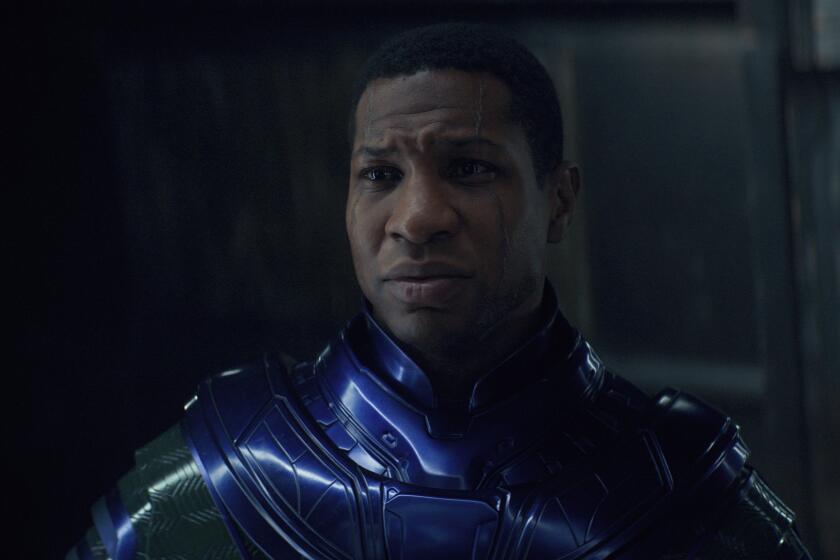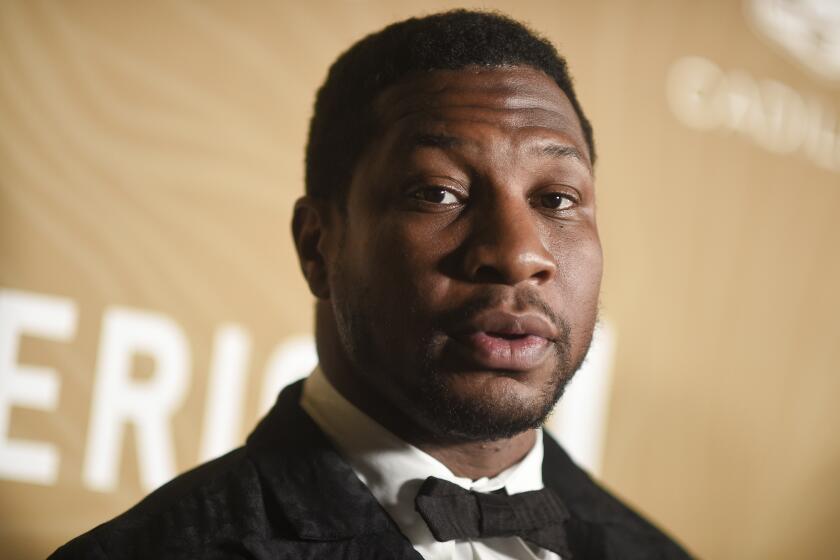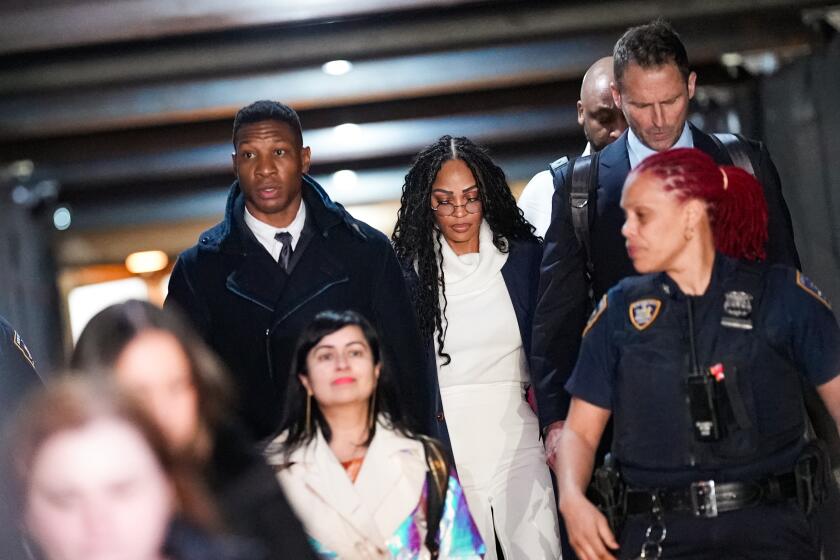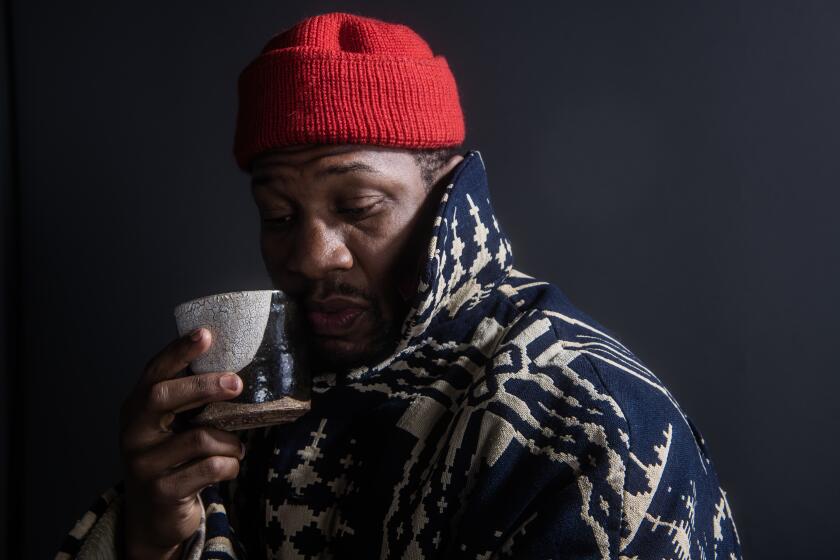Jonathan Majors: Experts weigh the jury’s split verdict and whether he’ll get jail time
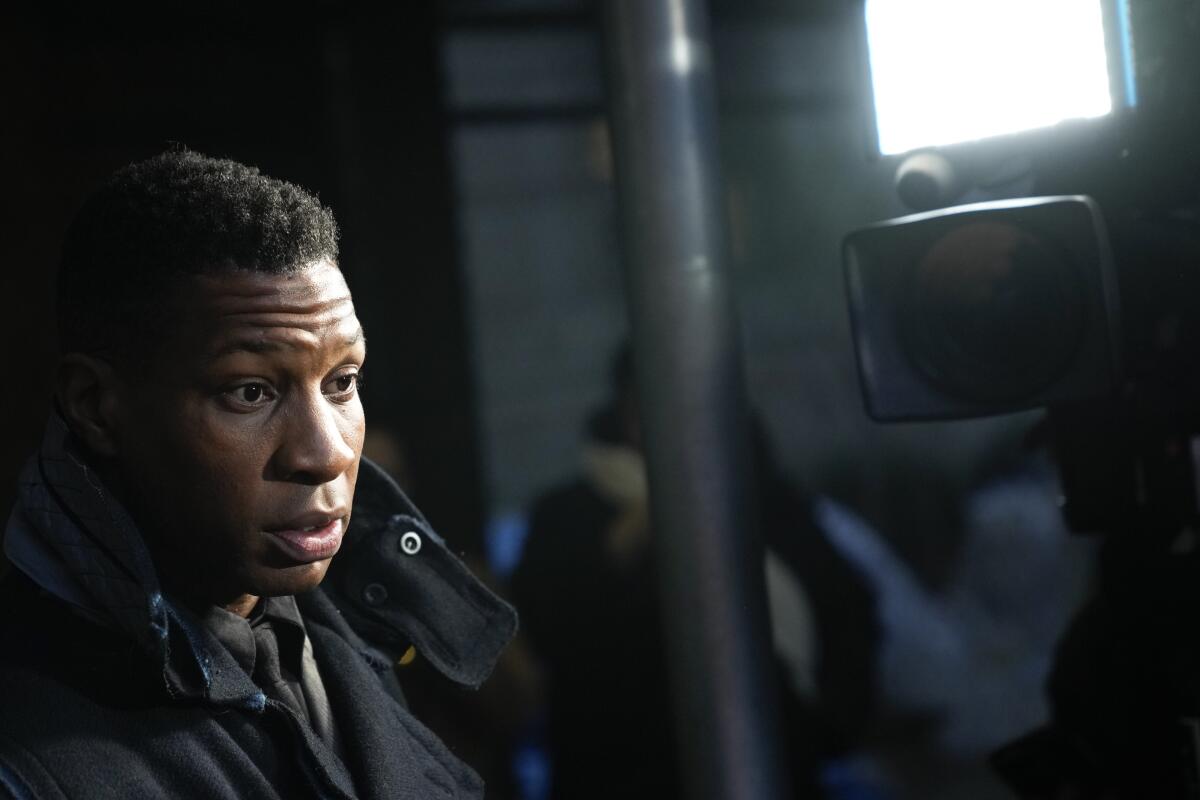
- Share via
It took a Manhattan jury about five hours, stretched over several days, to reach their split verdict in the Jonathan Majors assault case.
While jurors deliberated, the public drew its own conclusions about what happened as social media feasted on the various bits of newly released evidence — an audio recording of an irate Majors, text messages between the actor and his former girlfriend and, perhaps most intriguing, surveillance footage showing a scuffle and chase between Majors and Grace Jabbari outside of an SUV.
The jury decided that the now-former Marvel actor was guilty of recklessly assaulting in the third degree and harassing in the second degree his former girlfriend. Jurors acquitted Majors of intentional assault in the third degree and second-degree aggravated harassment.
Jonathan Majors was expected to play a key role in the MCU as villain Kang the Conqueror. Now that Marvel has cut ties with the actor, we look at what it means for the franchise’s future.
The split verdict was perplexing to some observers who wondered how jurors could have blamed Majors for one form of assault but not another, or one type of harassment and not the next. Those who felt the pieces of new evidence poked holes in the prosecutors’ case against Majors were also puzzled by the outcome. How could someone who was running away be the aggressor? Others questioned which of the charges were tied to specific actions by Majors.
In other words, what does it mean that he assaulted his former girlfriend recklessly in the third degree? Or that he harassed her in the second degree?
As Majors’ rapid spiral from Hollywood stardom continued, with Marvel parting ways with him soon after the verdict, The Times interviewed several legal experts who followed Majors’ trial to shed light on the actor’s convictions and acquittals.
Inside vs. outside the SUV
As deliberations began last week, New York criminal court Judge Michael Gaffey instructed the jury to separate the four charges into two categories: conduct that happened inside the car and conduct outside the car.
The only charge that related to actions outside the SUV was harassment in the second degree. That means the rest of the charges — third-degree intentional assault, third-degree reckless assault and second-degree aggravated harassment — all related to behavior inside the vehicle.
A Manhattan jury found actor Jonathan Majors guilty of assaulting ex-girlfriend Grace Jabbari, ending the high-profile domestic violence trial.
Prosecutors said Majors assaulted Jabbari after she read a romantic text message that had been sent to his phone by another woman as the pair rode inside the private car service SUV in March. Majors allegedly grabbed Jabbari’s hand so hard he fractured her middle finger and also allegedly struck her face with an open hand and pushed her into a vehicle. She was hospitalized for minor injuries and documented them in photos that were shared with the jury.
Earlier in the case, each charge was tied to a specific action, such as the allegation of Majors twisting Jabbari’s arm back or fracturing her middle finger. However, before the trial, prosecutors decided to group the charges together in the more general terms of inside and outside the car.
“That makes perfect sense to me that just given what they had in front of them and what evidence they were able to document, to consolidate and look at this on a broader scale,” said Heather E. Cucolo, a professor at New York Law School who followed the trial. She said trying to prove more specific actions to a jury would have been a steeper task for prosecutors. That’s especially true in domestic violence cases, she said, in which concrete evidence that depicts the actual incident is rare.
“I think that across the board, it can be extremely difficult for a prosecutor to prove the elements of the crime charged when there isn’t a clear enough link between the injuries that are documented after the fact and what type of physical altercation occurred that caused those injuries,” Cucolo said. “It is extremely difficult to piece together a series of events.”
Different definitions of assault and harassment
After the verdict, Majors’ attorneys released a statement suggesting that the split verdict meant the jury did not believe Jabbari’s account of what happened between the two inside the SUV “because they found that Mr. Majors did not intentionally cause any injuries to her.” Multiple outlets also reported that Majors’ acquittal on the intentional assault charge meant he was absolved of the more serious crime.
However, legal experts interviewed by The Times argued that such assertions are not true.
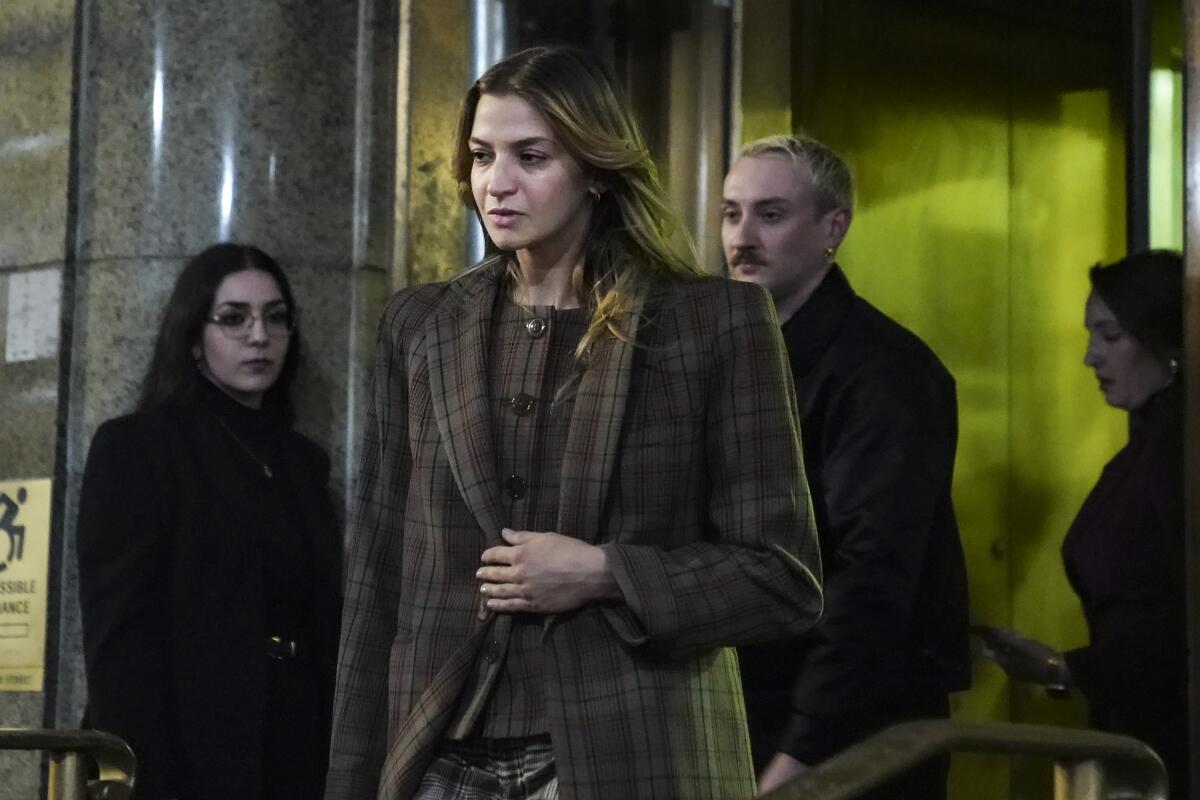
Elaine Chiu, a professor at St. John’s University School of Law who also worked as a prosecutor with the Manhattan District Attorney’s office, specializing in domestic violence, said that while some states place intentional assault as a more serious offense versus reckless assault, under New York criminal law they are equal.
“It’s still a serious crime,” Chiu said. “Because if you think about it, what’s worse: the person who wanted to hurt you and hurt you, or a person who didn’t want to hurt you, totally understood the risks of doing what they did, and for their own agenda, they did it anyway? Both are pretty bad.”
Both forms of assault in this case — intentional and reckless — have to do with Majors’ state of mind, she said. Intentional assault means the individual had the desire to physically injure the other person. Reckless assault, which Majors was convicted of, means he didn’t necessarily want to hurt Jabbari, but did so anyway.
“[Jurors] have found that he didn’t want to hurt her,” Chiu said, “but he wanted his phone back, or he wanted to get away from her, or whatever it was, and in doing so, he pursued certain behaviors where he knew that there were risks that she could get hurt.”
Marvel has dropped actor Jonathan Majors after the actor was found guilty of assault and harassment on Monday.
Jurors ultimately disagreed with the argument made by defense attorneys that Jabbari had somehow injured herself, perhaps while at a club where she was spotted after the incident. With their guilty verdict, the jury said that Majors injured Jabbari at some point inside the SUV. But with their not-guilty decision, they also said that Majors did not intend to injure Jabbari during the scuffle.
Majors was also convicted of second-degree harassment, which in New York is not a crime but considered a violation, more akin to a traffic ticket. The other three charges in the case were misdemeanors.
Harassment, unlike assault, does not require proof of physical injury, only the intent to alarm, harass or annoy a person, Chiu said, in this case, doing so by threatening to kick, strike, hit or touch another person.
Since this charge is the only tie into conduct outside of the SUV, it is possible that jurors weighed moments in the surveillance footage that show Majors shoving Jabbari back inside the SUV, as well as other instances where he pushed her away as she made chase.
Cucolo said the jury’s decision to believe Jabbari’s story, even in part, can be validating to other victims of domestic or intimate partner violence.
“Even with all of the attempts to put out negative information or paint a negative picture of the victim, despite that, there was still a conviction in this case,” she said, referring to the intense cross-examination of Jabbari from defense attorneys during several days of emotional testimony. “And this isn’t a situation where we’re looking at severe injuries as a result of domestic violence yet, even so, it was enough to hold an aggressor, a perpetrator accountable — I think that that’s an important message.”
Will Majors get jail time?
Though Majors’ conviction holds a maximum jail sentence of one year, it is unlikely he will be incarcerated, Chiu and Cucolo said, especially since the actor does not have any prior criminal convictions.
However, it remains a possibility that given the high-profile nature of the case, the judge may want to make an example of Majors, Cucolo said.
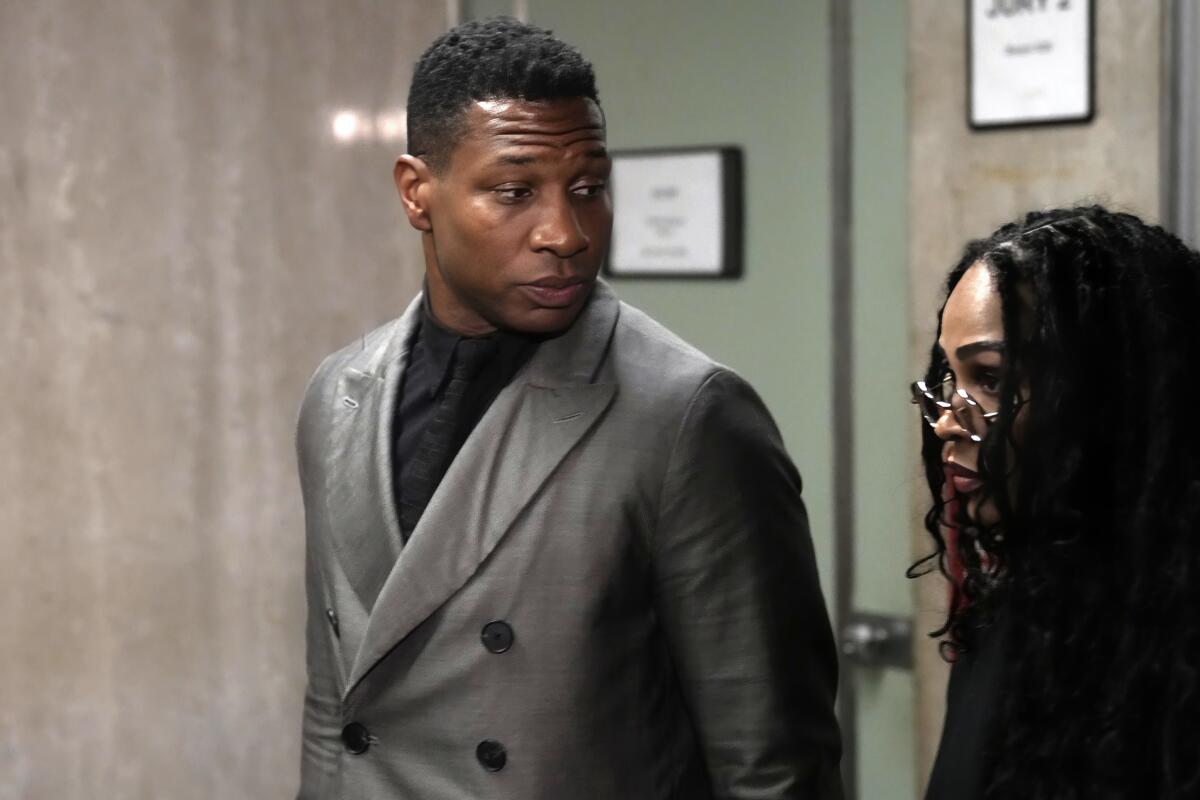
“The sentencing may very well be tied to who Jonathan Majors is, and how this case has been portrayed in the media to the public and whether or not an example needs to be set,” she said.
Even so, both pointed to Manhattan Dist. Atty. Alvin Bragg’s robust system of alternatives to jail and prison time. Known as a progressive district attorney, Bragg has touted his Pathways to Public Safety division, which bolsters programs that provide counseling, restorative justice practices and other forms of support for both victim and perpetrator. Probation is also a possible outcome, both added.
Representatives for the D.A.’s office declined to comment on sentencing recommendations it may be pursuing for Majors. A sentencing hearing is set for Feb. 6. However, at the close of trial, Gaffey said that date could be delayed if Majors’ attorneys file any motions to appeal the conviction.
After the jury’s decision on Monday, Majors’ attorney Priya Chaudhry suggested such an appeal is likely.
“Mr. Majors still has faith in the process,” she said in a statement, “and looks forward to fully clearing his name.”
News Analysis: What Jonathan Majors’ dramatic rise and fall says about race and justice in Hollywood
The actor, who this week faces his first court date in a domestic dispute, may suffer more career damage than his Hollywood counterparts do. Is race a factor?
More to Read
Only good movies
Get the Indie Focus newsletter, Mark Olsen's weekly guide to the world of cinema.
You may occasionally receive promotional content from the Los Angeles Times.
